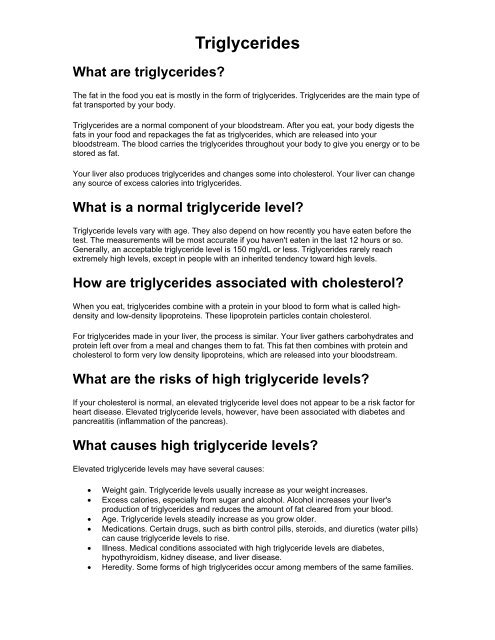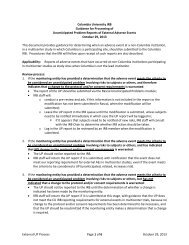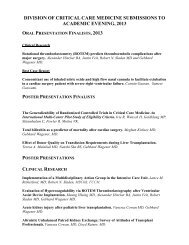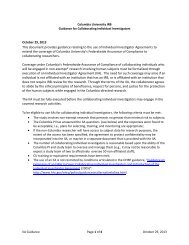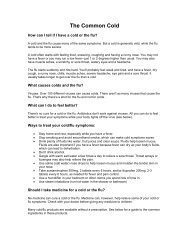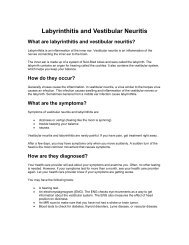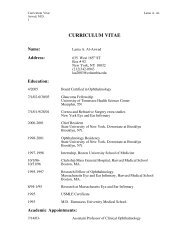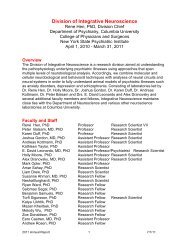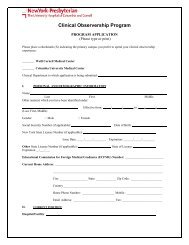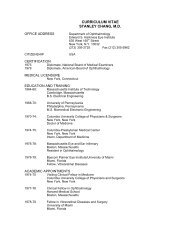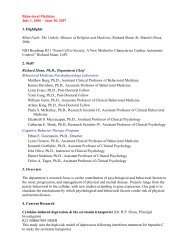Triglycerides
Triglycerides
Triglycerides
You also want an ePaper? Increase the reach of your titles
YUMPU automatically turns print PDFs into web optimized ePapers that Google loves.
What are triglycerides?<br />
<strong>Triglycerides</strong><br />
The fat in the food you eat is mostly in the form of triglycerides. <strong>Triglycerides</strong> are the main type of<br />
fat transported by your body.<br />
<strong>Triglycerides</strong> are a normal component of your bloodstream. After you eat, your body digests the<br />
fats in your food and repackages the fat as triglycerides, which are released into your<br />
bloodstream. The blood carries the triglycerides throughout your body to give you energy or to be<br />
stored as fat.<br />
Your liver also produces triglycerides and changes some into cholesterol. Your liver can change<br />
any source of excess calories into triglycerides.<br />
What is a normal triglyceride level?<br />
Triglyceride levels vary with age. They also depend on how recently you have eaten before the<br />
test. The measurements will be most accurate if you haven't eaten in the last 12 hours or so.<br />
Generally, an acceptable triglyceride level is 150 mg/dL or less. <strong>Triglycerides</strong> rarely reach<br />
extremely high levels, except in people with an inherited tendency toward high levels.<br />
How are triglycerides associated with cholesterol?<br />
When you eat, triglycerides combine with a protein in your blood to form what is called highdensity<br />
and low-density lipoproteins. These lipoprotein particles contain cholesterol.<br />
For triglycerides made in your liver, the process is similar. Your liver gathers carbohydrates and<br />
protein left over from a meal and changes them to fat. This fat then combines with protein and<br />
cholesterol to form very low density lipoproteins, which are released into your bloodstream.<br />
What are the risks of high triglyceride levels?<br />
If your cholesterol is normal, an elevated triglyceride level does not appear to be a risk factor for<br />
heart disease. Elevated triglyceride levels, however, have been associated with diabetes and<br />
pancreatitis (inflammation of the pancreas).<br />
What causes high triglyceride levels?<br />
Elevated triglyceride levels may have several causes:<br />
• Weight gain. Triglyceride levels usually increase as your weight increases.<br />
• Excess calories, especially from sugar and alcohol. Alcohol increases your liver's<br />
production of triglycerides and reduces the amount of fat cleared from your blood.<br />
• Age. Triglyceride levels steadily increase as you grow older.<br />
• Medications. Certain drugs, such as birth control pills, steroids, and diuretics (water pills)<br />
can cause triglyceride levels to rise.<br />
• Illness. Medical conditions associated with high triglyceride levels are diabetes,<br />
hypothyroidism, kidney disease, and liver disease.<br />
• Heredity. Some forms of high triglycerides occur among members of the same families.
How is it diagnosed?<br />
A simple blood test can diagnose high triglyceride levels. Your health care provider will ask you<br />
not to eat for about 12 to 14 hours before your blood is taken. This allows the triglycerides from<br />
your food to be completely eliminated. Your provider wants to know only the amount of<br />
triglycerides being made by your body, not what is produced by eating.<br />
How is it treated?<br />
Treatment for elevated triglyceride levels includes the following.<br />
• Lose weight. Weight loss alone often will lower your triglyceride levels.<br />
• Exercise. Regular exercise makes weight loss quicker and easier.<br />
• Eat less sugar and sugar-containing foods. Instead of sweetened fruit juices, use fresh<br />
unsweetened fruit or unsweetened fruit juice. Instead of putting sugar in your coffee, use<br />
an artificial sweetener.<br />
• Eat your meals and snacks throughout the day. Don't eat just 2 large meals a day.<br />
• Drink less alcohol. Some people are very sensitive to alcohol's ability to increase the<br />
liver's production of triglycerides.<br />
• Limit fat to less than 30% of your daily calories.<br />
If these lifestyle changes don't lower your triglyceride levels, your health care provider may<br />
prescribe a medicine such as gemfibrozil or nicotinic acid (niacin). Gemfibrozil decreases the<br />
liver's production of triglycerides and clears triglycerides from your blood. It also helps reduce<br />
cholesterol. Niacin in large doses also helps reduce total cholesterol as well as triglyceride levels.<br />
Check with your provider before taking niacin to make sure it is OK for you to take it. Your<br />
provider will recommend a dosage for you.<br />
Fish oil also has been found to reduce triglycerides. Two or three meals of fish such as salmon or<br />
mackerel every week may help lower your triglyceride levels.<br />
Published by McKesson Health Solutions LLC.<br />
This content is reviewed periodically and is subject to change as new health information becomes available. The<br />
information is intended to inform and educate and is not a replacement for medical evaluation, advice, diagnosis or<br />
treatment by a healthcare professional.<br />
Developed by McKesson Health Solutions LLC.<br />
Copyright © 2003 McKesson Health Solutions LLC. All rights reserved.<br />
Special Instructions:<br />
Copyright © Clinical Reference Systems 2004<br />
Adult Health Advisor<br />
Copyright © 2004 Elsevier Inc. All rights reserved.<br />
www.mdconsult.com


